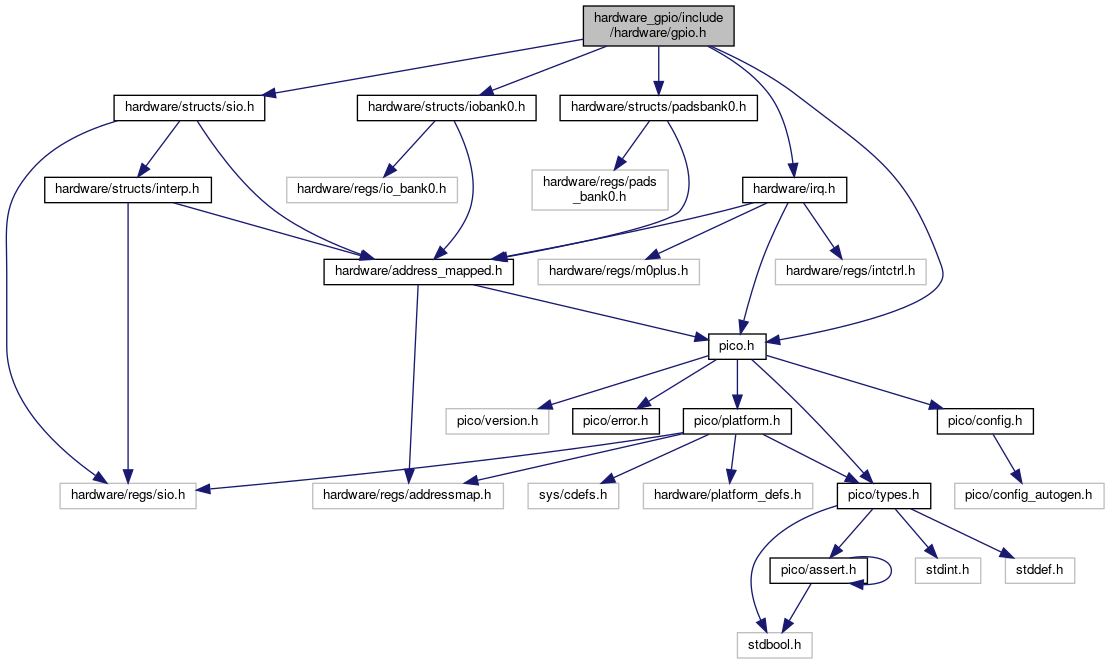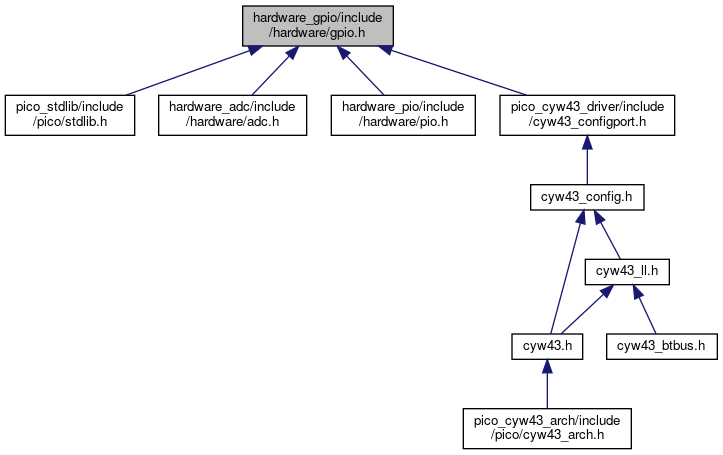#include "pico.h"#include "hardware/structs/sio.h"#include "hardware/structs/padsbank0.h"#include "hardware/structs/iobank0.h"#include "hardware/irq.h"

Go to the source code of this file.
Macros | |
| #define | PARAM_ASSERTIONS_ENABLED_GPIO 0 |
| #define | GPIO_OUT 1 |
| #define | GPIO_IN 0 |
| #define | GPIO_IRQ_CALLBACK_ORDER_PRIORITY PICO_SHARED_IRQ_HANDLER_LOWEST_ORDER_PRIORITY |
| #define | GPIO_RAW_IRQ_HANDLER_DEFAULT_ORDER_PRIORITY PICO_SHARED_IRQ_HANDLER_DEFAULT_ORDER_PRIORITY |
| #define | PICO_DEBUG_PIN_BASE 19u |
| #define | PICO_DEBUG_PIN_COUNT 3u |
| #define | CU_REGISTER_DEBUG_PINS(...) enum __unused DEBUG_PIN_TYPE { _none = 0, __VA_ARGS__ }; static enum DEBUG_PIN_TYPE __selected_debug_pins; |
| #define | CU_SELECT_DEBUG_PINS(x) static enum DEBUG_PIN_TYPE __selected_debug_pins = (x); |
| #define | DEBUG_PINS_ENABLED(p) (__selected_debug_pins == (p)) |
| #define | DEBUG_PINS_SET(p, v) if (DEBUG_PINS_ENABLED(p)) gpio_set_mask((unsigned)(v)<<PICO_DEBUG_PIN_BASE) |
| #define | DEBUG_PINS_CLR(p, v) if (DEBUG_PINS_ENABLED(p)) gpio_clr_mask((unsigned)(v)<<PICO_DEBUG_PIN_BASE) |
| #define | DEBUG_PINS_XOR(p, v) if (DEBUG_PINS_ENABLED(p)) gpio_xor_mask((unsigned)(v)<<PICO_DEBUG_PIN_BASE) |
Typedefs | |
| typedef void(* | gpio_irq_callback_t) (uint gpio, uint32_t event_mask) |
Enumerations | |
| enum | gpio_function { GPIO_FUNC_XIP = 0, GPIO_FUNC_SPI = 1, GPIO_FUNC_UART = 2, GPIO_FUNC_I2C = 3, GPIO_FUNC_PWM = 4, GPIO_FUNC_SIO = 5, GPIO_FUNC_PIO0 = 6, GPIO_FUNC_PIO1 = 7, GPIO_FUNC_GPCK = 8, GPIO_FUNC_USB = 9, GPIO_FUNC_NULL = 0x1f } |
| GPIO function definitions for use with function select. More... | |
| enum | gpio_irq_level { GPIO_IRQ_LEVEL_LOW = 0x1u, GPIO_IRQ_LEVEL_HIGH = 0x2u, GPIO_IRQ_EDGE_FALL = 0x4u, GPIO_IRQ_EDGE_RISE = 0x8u } |
| GPIO Interrupt level definitions (GPIO events) More... | |
| enum | gpio_override { GPIO_OVERRIDE_NORMAL = 0, GPIO_OVERRIDE_INVERT = 1, GPIO_OVERRIDE_LOW = 2, GPIO_OVERRIDE_HIGH = 3 } |
| enum | gpio_slew_rate { GPIO_SLEW_RATE_SLOW = 0, GPIO_SLEW_RATE_FAST = 1 } |
| Slew rate limiting levels for GPIO outputsSlew rate limiting increases the minimum rise/fall time when a GPIO output is lightly loaded, which can help to reduce electromagnetic emissions. More... | |
| enum | gpio_drive_strength { GPIO_DRIVE_STRENGTH_2MA = 0, GPIO_DRIVE_STRENGTH_4MA = 1, GPIO_DRIVE_STRENGTH_8MA = 2, GPIO_DRIVE_STRENGTH_12MA = 3 } |
| Drive strength levels for GPIO outputsDrive strength levels for GPIO outputs. More... | |
Functions | |
| static void | check_gpio_param (__unused uint gpio) |
| void | gpio_set_function (uint gpio, enum gpio_function fn) |
| Select GPIO function. More... | |
| enum gpio_function | gpio_get_function (uint gpio) |
| Determine current GPIO function. More... | |
| void | gpio_set_pulls (uint gpio, bool up, bool down) |
| Select up and down pulls on specific GPIO. More... | |
| static void | gpio_pull_up (uint gpio) |
| Set specified GPIO to be pulled up. More... | |
| static bool | gpio_is_pulled_up (uint gpio) |
| Determine if the specified GPIO is pulled up. More... | |
| static void | gpio_pull_down (uint gpio) |
| Set specified GPIO to be pulled down. More... | |
| static bool | gpio_is_pulled_down (uint gpio) |
| Determine if the specified GPIO is pulled down. More... | |
| static void | gpio_disable_pulls (uint gpio) |
| Disable pulls on specified GPIO. More... | |
| void | gpio_set_irqover (uint gpio, uint value) |
| Set GPIO IRQ overrideOptionally invert a GPIO IRQ signal, or drive it high or low. More... | |
| void | gpio_set_outover (uint gpio, uint value) |
| Set GPIO output override. More... | |
| void | gpio_set_inover (uint gpio, uint value) |
| Select GPIO input override. More... | |
| void | gpio_set_oeover (uint gpio, uint value) |
| Select GPIO output enable override. More... | |
| void | gpio_set_input_enabled (uint gpio, bool enabled) |
| Enable GPIO input. More... | |
| void | gpio_set_input_hysteresis_enabled (uint gpio, bool enabled) |
| Enable/disable GPIO input hysteresis (Schmitt trigger)Enable or disable the Schmitt trigger hysteresis on a given GPIO. This is enabled on all GPIOs by default. Disabling input hysteresis can lead to inconsistent readings when the input signal has very long rise or fall times, but slightly reduces the GPIO's input delay. More... | |
| bool | gpio_is_input_hysteresis_enabled (uint gpio) |
| Determine whether input hysteresis is enabled on a specified GPIO. More... | |
| void | gpio_set_slew_rate (uint gpio, enum gpio_slew_rate slew) |
| Set slew rate for a specified GPIO. More... | |
| enum gpio_slew_rate | gpio_get_slew_rate (uint gpio) |
| Determine current slew rate for a specified GPIO. More... | |
| void | gpio_set_drive_strength (uint gpio, enum gpio_drive_strength drive) |
| Set drive strength for a specified GPIO. More... | |
| enum gpio_drive_strength | gpio_get_drive_strength (uint gpio) |
| Determine current slew rate for a specified GPIO. More... | |
| void | gpio_set_irq_enabled (uint gpio, uint32_t event_mask, bool enabled) |
| Enable or disable specific interrupt events for specified GPIOThis function sets which GPIO events cause a GPIO interrupt on the calling core. See gpio_set_irq_callback, gpio_set_irq_enabled_with_callback and gpio_add_raw_irq_handler to set up a GPIO interrupt handler to handle the events. More... | |
| void | gpio_set_irq_callback (gpio_irq_callback_t callback) |
| Set the generic callback used for GPIO IRQ events for the current coreThis function sets the callback used for all GPIO IRQs on the current core that are not explicitly hooked via gpio_add_raw_irq_handler or other gpio_add_raw_irq_handler_ functions. More... | |
| void | gpio_set_irq_enabled_with_callback (uint gpio, uint32_t event_mask, bool enabled, gpio_irq_callback_t callback) |
| Convenience function which performs multiple GPIO IRQ related initializationsThis method is a slightly eclectic mix of initialization, that: More... | |
| void | gpio_set_dormant_irq_enabled (uint gpio, uint32_t event_mask, bool enabled) |
| Enable dormant wake up interrupt for specified GPIO and eventsThis configures IRQs to restart the XOSC or ROSC when they are disabled in dormant mode. More... | |
| static uint32_t | gpio_get_irq_event_mask (uint gpio) |
| Return the current interrupt status (pending events) for the given GPIO. More... | |
| void | gpio_acknowledge_irq (uint gpio, uint32_t event_mask) |
| Acknowledge a GPIO interrupt for the specified events on the calling core. More... | |
| void | gpio_add_raw_irq_handler_with_order_priority_masked (uint gpio_mask, irq_handler_t handler, uint8_t order_priority) |
| Adds a raw GPIO IRQ handler for the specified GPIOs on the current coreIn addition to the default mechanism of a single GPIO IRQ event callback per core (see gpio_set_irq_callback), it is possible to add explicit GPIO IRQ handlers which are called independent of the default callback. The order relative to the default callback can be controlled via the order_priority parameter (the default callback has the priority GPIO_IRQ_CALLBACK_ORDER_PRIORITY which defaults to the lowest priority with the intention of it running last). More... | |
| static void | gpio_add_raw_irq_handler_with_order_priority (uint gpio, irq_handler_t handler, uint8_t order_priority) |
| Adds a raw GPIO IRQ handler for a specific GPIO on the current coreIn addition to the default mechanism of a single GPIO IRQ event callback per core (see gpio_set_irq_callback), it is possible to add explicit GPIO IRQ handlers which are called independent of the default callback. The order relative to the default callback can be controlled via the order_priority parameter(the default callback has the priority GPIO_IRQ_CALLBACK_ORDER_PRIORITY which defaults to the lowest priority with the intention of it running last). More... | |
| void | gpio_add_raw_irq_handler_masked (uint gpio_mask, irq_handler_t handler) |
| Adds a raw GPIO IRQ handler for the specified GPIOs on the current coreIn addition to the default mechanism of a single GPIO IRQ event callback per core (see gpio_set_irq_callback), it is possible to add explicit GPIO IRQ handlers which are called independent of the default event callback. More... | |
| static void | gpio_add_raw_irq_handler (uint gpio, irq_handler_t handler) |
| Adds a raw GPIO IRQ handler for a specific GPIO on the current coreIn addition to the default mechanism of a single GPIO IRQ event callback per core (see gpio_set_irq_callback), it is possible to add explicit GPIO IRQ handlers which are called independent of the default event callback. More... | |
| void | gpio_remove_raw_irq_handler_masked (uint gpio_mask, irq_handler_t handler) |
| Removes a raw GPIO IRQ handler for the specified GPIOs on the current coreIn addition to the default mechanism of a single GPIO IRQ event callback per core (see gpio_set_irq_callback), it is possible to add explicit GPIO IRQ handlers which are called independent of the default event callback. More... | |
| static void | gpio_remove_raw_irq_handler (uint gpio, irq_handler_t handler) |
| Removes a raw GPIO IRQ handler for the specified GPIO on the current coreIn addition to the default mechanism of a single GPIO IRQ event callback per core (see gpio_set_irq_callback), it is possible to add explicit GPIO IRQ handlers which are called independent of the default event callback. More... | |
| void | gpio_init (uint gpio) |
| Initialise a GPIO for (enabled I/O and set func to GPIO_FUNC_SIO)Clear the output enable (i.e. set to input). Clear any output value. More... | |
| void | gpio_deinit (uint gpio) |
| Resets a GPIO back to the NULL function, i.e. disables it. More... | |
| void | gpio_init_mask (uint gpio_mask) |
| Initialise multiple GPIOs (enabled I/O and set func to GPIO_FUNC_SIO)Clear the output enable (i.e. set to input). Clear any output value. More... | |
| static bool | gpio_get (uint gpio) |
| Get state of a single specified GPIO. More... | |
| static uint32_t | gpio_get_all (void) |
| Get raw value of all GPIOs. More... | |
| static void | gpio_set_mask (uint32_t mask) |
| Drive high every GPIO appearing in mask. More... | |
| static void | gpio_clr_mask (uint32_t mask) |
| Drive low every GPIO appearing in mask. More... | |
| static void | gpio_xor_mask (uint32_t mask) |
| Toggle every GPIO appearing in mask. More... | |
| static void | gpio_put_masked (uint32_t mask, uint32_t value) |
| Drive GPIO high/low depending on parameters. More... | |
| static void | gpio_put_all (uint32_t value) |
| Drive all pins simultaneously. More... | |
| static void | gpio_put (uint gpio, bool value) |
| Drive a single GPIO high/low. More... | |
| static bool | gpio_get_out_level (uint gpio) |
| Determine whether a GPIO is currently driven high or lowThis function returns the high/low output level most recently assigned to a GPIO via gpio_put() or similar. This is the value that is presented outward to the IO muxing, not the input level back from the pad (which can be read using gpio_get()). More... | |
| static void | gpio_set_dir_out_masked (uint32_t mask) |
| Set a number of GPIOs to outputSwitch all GPIOs in "mask" to output. More... | |
| static void | gpio_set_dir_in_masked (uint32_t mask) |
| Set a number of GPIOs to input. More... | |
| static void | gpio_set_dir_masked (uint32_t mask, uint32_t value) |
| Set multiple GPIO directions. More... | |
| static void | gpio_set_dir_all_bits (uint32_t values) |
| Set direction of all pins simultaneously. More... | |
| static void | gpio_set_dir (uint gpio, bool out) |
| Set a single GPIO direction. More... | |
| static bool | gpio_is_dir_out (uint gpio) |
| Check if a specific GPIO direction is OUT. More... | |
| static uint | gpio_get_dir (uint gpio) |
| Get a specific GPIO direction. More... | |
| void | gpio_debug_pins_init (void) |
| enum gpio_override |
| Enumerator | |
|---|---|
| GPIO_OVERRIDE_NORMAL | peripheral signal selected via gpio_set_function |
| GPIO_OVERRIDE_INVERT | invert peripheral signal selected via gpio_set_function |
| GPIO_OVERRIDE_LOW | drive low/disable output |
| GPIO_OVERRIDE_HIGH | drive high/enable output |